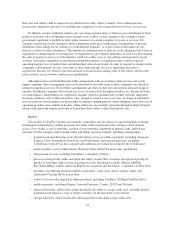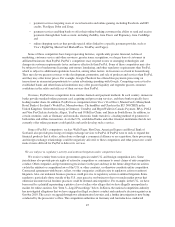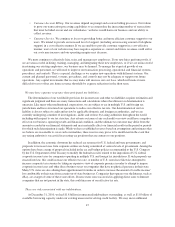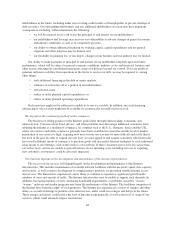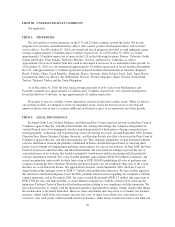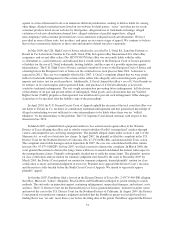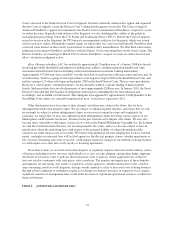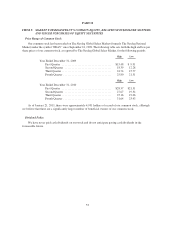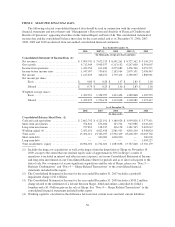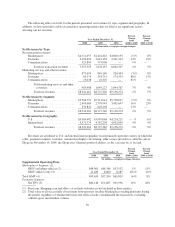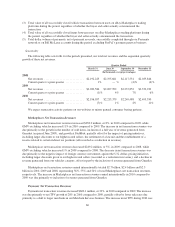eBay 2010 Annual Report Download - page 56
Download and view the complete annual report
Please find page 56 of the 2010 eBay annual report below. You can navigate through the pages in the report by either clicking on the pages listed below, or by using the keyword search tool below to find specific information within the annual report.against us or have threatened to do so in numerous different jurisdictions, seeking to hold us liable for, among
other things, alleged counterfeit items listed on our websites by third parties, “tester” and other not for resale
consumer products listed on our websites by third parties, alleged misuse of trademarks in listings, alleged
violations of selective distribution channel laws, alleged violations of parallel import laws, alleged
non-compliance with consumer protection laws or in connection with paid search advertisements. We have
prevailed in some of these suits, lost in others, and many are in various stages of appeal. We continue to believe
that we have meritorious defenses to these suits and intend to defend ourselves vigorously.
In May 2009, the U.K. High Court of Justice ruled in the case filed by L’Oréal SA, Lancôme Parfums et
Beauté & Cie, Laboratoire Garnier & Cie and L’Oréal (UK) Ltd against eBay International AG, other eBay
companies, and several eBay sellers (No. HC07CO1978) that eBay was not jointly liable with the seller
co-defendants as a joint tortfeasor, and indicated that it would certify to the European Court of Justice questions
of liability for the use of L’Oréal trademarks, hosting liability, and the scope of a possible injunction against
intermediaries. The U.K. High Court of Justice certified a number of issues to the European Court of Justice and
a hearing before the European Court of Justice on the certified issues took place in June 2010. A decision is
expected in 2011. The case was originally filed in July 2007. L’Oréal’s complaint alleged that we were jointly
liable for trademark infringement for the actions of the sellers who allegedly sold counterfeit goods, parallel
imports and testers (not for resale products). Additionally, L’Oréal claimed that eBay’s use of L’Oréal brands on
its website, in its search engine and in sponsored links, and purchase of L’Oréal trademarks as keywords,
constitute trademark infringement. The suit sought an injunction preventing future infringement, full disclosure
of the identity of all past and present sellers of infringing L’Oréal goods, and a declaration that our Verified
Rights Owner (VeRO) program as then operated was insufficient to prevent such infringement. Other damages
claimed are to be specified after the liability stage of the proceedings.
In April 2010, the U.S. Second Circuit Court of Appeals upheld the decision of the trial court that eBay was
not liable to Tiffany & Co. for direct or contributory trademark infringement and that generalized knowledge of
alleged counterfeiting was not sufficient to cause intermediaries to be liable where there was no “willful
blindness” by the intermediary to the problem. The U.S. Supreme Court denied certiorari with respect to this
decision in late 2010.
In March 2007, a plaintiff filed a purported antitrust class action lawsuit against eBay in the Western
District of Texas alleging that eBay and its wholly owned subsidiary PayPal “monopolized” markets through
various anticompetitive acts and tying arrangements. The plaintiff alleged claims under sections 1 and 2 of the
Sherman Act, as well as related state law claims. In April 2007, the plaintiff re-filed the complaint in the U.S.
District Court for the Northern District of California (No. 07-CV-01882-RS), and dismissed the Texas action.
The complaint seeks treble damages and an injunction. In 2007, the case was consolidated with other similar
lawsuits (No. 07-CV-01882JF). In June 2007, we filed a motion to dismiss the complaint. In March 2008, the
court granted the motion to dismiss the tying claims with leave to amend and denied the motion with respect to
the monopolization claims. Plaintiffs subsequently decided not to refile the tying claims. The plaintiffs’ motion
on class certification and our motion for summary judgment were heard by the court in December 2009. In
March 2010, the District Court granted our motion for summary judgment, denied plaintiffs’ motion for class
certification as moot, and entered judgment in our favor. Plaintiffs have appealed the District Court’s decision,
and the matter is fully briefed before the Ninth Circuit Court of Appeals. We intend to vigorously oppose
plaintiffs’ appeal.
In October 2007, PartsRiver filed a lawsuit in the Eastern District of Texas (No. 2-07CV-440-DF) alleging
that eBay, Microsoft, Yahoo!, Shopzilla, PriceGrabber and PriceRunner infringed its patent relating to search
methods. The suit seeks an injunction against continuing infringement, unspecified damages, and interest, costs,
and fees. The U.S. District Court for the Eastern District of Texas granted defendants’ motion to transfer venue
and moved the case to the U.S. District Court for the Northern District of California. In August 2009, the District
Court granted our motion for summary judgment and ruled that the PartsRiver patent was invalid based on a
finding that it was “on sale” more than a year before the filing date of the patent. PartsRiver appealed the District
51





